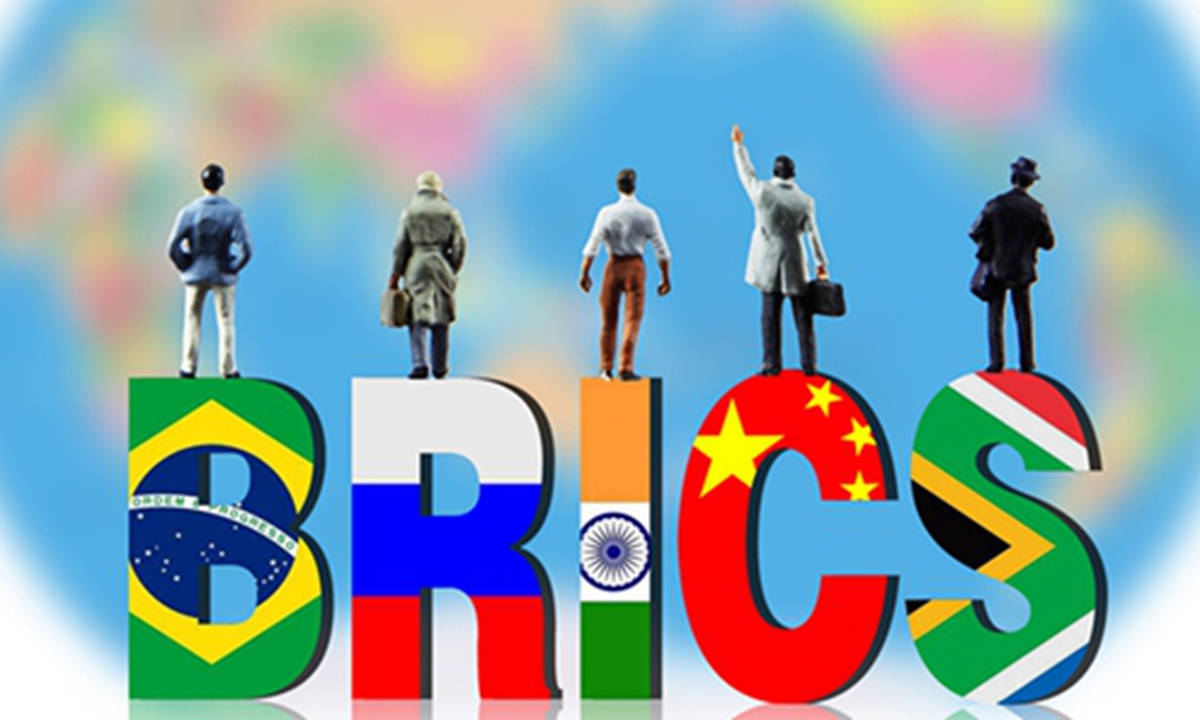
BRICS Photo: VCG
The coming BRICS Summit - to be hosted online by China on June 23 - is already drawing attention for becoming the first multilateral forum of this year where Russian President Vladimir Putin will be seen interacting directly with national leaders from China, India, Brazil, South Africa and several other invited nations.
The summit likely would be read in the West as the BRICS countries' enhanced support and endorsement of Putin's policies. This is because they have been extremely uncomfortable with all BRICS members resisting the US-led campaign to denounce Russian actions and slap unbearable sanctions against Russia.
The reality is that China stands out as the largest importer of Russian energy and India as the largest importer of Russian defense equipment. What adds to US discomfiture is that most of its own allies have also been and continued to be major importers of Russian energy. But while the Ukraine crisis has seen US allies reduce their Russian imports, China and India have increased theirs. This has been facilitated by the BRICS' shared policy stance on Ukraine: refusing to denounce Russia, urging both sides for immediate cessation of hos-tilities and for initiating direct talk to resolve this crisis.
Second, the most novel proposition of this summit - BRICS expansion - also makes the presence of Putin and several new invitees open to various interpretations. The Ukraine crisis has seen fissures emerge in the G20 and adding new members to BRICS could make it an alternative minus US and its allies. This could also mean an expanded BRICS overtaking G7 earlier than imagined.
BRICS has been shy of adding new members and South Africa was the last to be added in 2010. But a change in mood is in the making. Last year, BRICS added Bangladesh, Egypt, the United Arab Emirates (UAE) and Uruguay to its New Development Bank. Last month, BRICS foreign ministers were joined by representatives from Argentina, Egypt, Indonesia, Kazakhstan, Nigeria, the UAE, Saudi Arabia, Senegal and Thailand. National leaders of some of these countries are expected to join the summit and several others will join the BRICS usual leaders' outreach summit.
Third, BRICS has always stood as a unique forum that holds dozens of pentagonal meetings that precede their annual summits. These include meetings of their think-tanks, academics, experts, corporates, journalists, followed by advisors, several officials and senior ministers including their foreign ministers. This building of an annual momentum and the resultant institutionalization with relatively lesser media glare have helped BRICS create favorable grassroots constituencies for building trust.
Fourth, though they also deliberated on issues of geopolitics and security, BRICS nations are known for their technocratic focus. This has resulted in piecemeal building of credibility reflected in their debates on creating an independent Credit Rating Agency as also in their initiatives like the Currency Reserves Arrangement and now nine-member New Develop-ment Bank which has already disbursed more than $15 billion and completed and/or sanctioned support for hundreds of projects. The bank now has regional offices in South Africa and India and its style of functioning has pushed Bretton Woods institutions into structural reforms.
Of course BRICS camaraderie has had its own share of challenges. Externally, BRICS has come to be compared with the US-led Quadrilateral Security Framework that includes Australia, Japan and India. Quad has had four summits in 14 months and precipitously expanded its agenda. At least US presents Quad as aimed at containing China though others vary in their engagement with Beijing. Internally, BRICS' members like Brazil or India are sometimes suspect for being closely aligned to the US.
India is a member of both BRICS and the Quad. Comparisons get drawn on how India had walked out of China-led Regional Comprehensive Economic Partnership but joined US President Joe Biden's Indo-Pacific Economic Framework for Prosperity last month. India is not just the second-largest and the fastest growing economy in BRICS but has had issues with Beijing. Also members like India, Brazil, South Africa may not be just sensitive to some of the proposed names for new additions and changes but perhaps susceptible to Western criticism of BRICS' evolving dynamics.
Moreover, most leaders attending the BRICS summit find themselves focused on their domestic challenges flowing from ongoing pandemic and Ukraine crisis and their eco-nomic and political fallouts like rising prices especially wheat and crude oil. The pandemic has seen China and India engaged in supplying healthcare to the Global South and more recently providing humanitarian assistance to countries from Ukraine to Sri Lanka.
In view of these being unusual times, modest expectations like the BRICS Summit consol-idating its extant initiatives and launching negotiations to build consensus on criteria for adding new members and other future initiatives should suffice.
(The author is a Visiting Professor, University of British Columbia and Fellow, Canadian Global Affairs Institute (Canada) and Professor of Jawaharlal Nehru University, India.)






